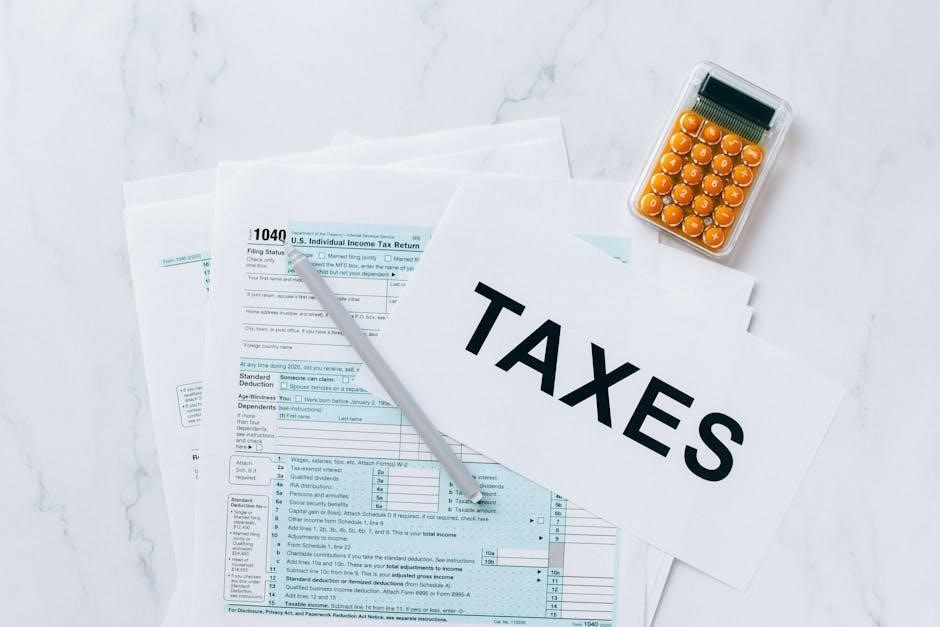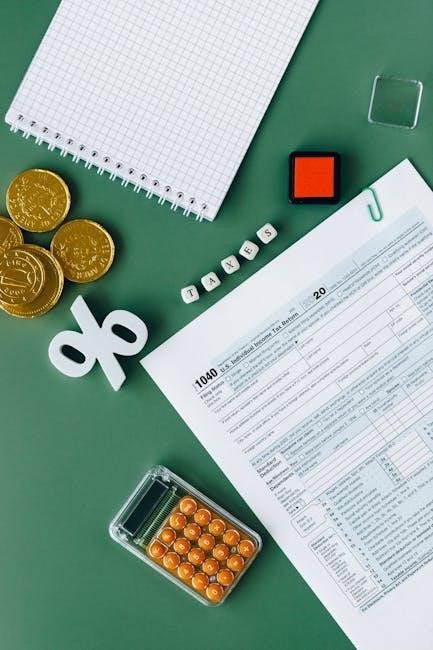Year 6 reasoning questions are designed to assess problem-solving skills, logical thinking, and analytical abilities․ These tests include verbal, non-verbal, and mathematical reasoning, preparing students for exams․
Overview of Year 6 Reasoning Tests
Year 6 reasoning tests are designed to evaluate problem-solving, logical thinking, and analytical skills․ These assessments typically include verbal, non-verbal, and mathematical reasoning questions․ Resources like PDF workbooks, online platforms, and past papers provide ample practice opportunities․ Tests often feature 35–40 minutes time frames, promoting time management․ Answers are usually included, enabling self-assessment․ Topics range from sequence patterns to word problems, ensuring comprehensive skill development․ Regular practice helps students adapt to exam formats, improving their ability to tackle diverse question types confidently․ These tools are essential for building resilience and accuracy in reasoning tasks, making them indispensable for Year 6 students preparing for exams․
Importance of Practicing Reasoning Questions
Practicing Year 6 reasoning questions is crucial for developing problem-solving skills and logical thinking․ Regular practice helps students understand question patterns, improve time management, and enhance accuracy․ By reviewing answers, learners can identify weaknesses and focus on improvement areas․ Resources like PDFs, workbooks, and online platforms provide structured practice, ensuring familiarity with test formats․ This preparation boosts confidence, reduces exam anxiety, and equips students with strategies to approach diverse question types effectively․ Consistent practice fosters resilience and a deeper understanding of reasoning concepts, ultimately leading to better performance in assessments and future academic challenges․
Structure of the Tests
Year 6 reasoning tests typically consist of multiple sections, each targeting specific skills․ Verbal reasoning questions may involve word sequences, analogies, and logic puzzles․ Non-verbal sections often include shape patterns and spatial awareness tasks․ Mathematical reasoning tests focus on problem-solving using numerical data․ Each test has a set time limit, usually 35 to 40 minutes, encouraging efficient thinking․ Questions are structured to increase in difficulty, allowing students to demonstrate their progression in critical thinking․ Answers are provided separately, enabling self-assessment and review․ The tests are designed to simulate exam conditions, helping students adapt to the format and improve their performance through practice․

Types of Reasoning Questions
Year 6 reasoning questions include verbal, non-verbal, and mathematical types․ Verbal tests logic with word-based problems, non-verbal uses shape patterns, and mathematical focuses on numerical logic․ Answers are provided․
Verbal Reasoning Questions
Verbal reasoning questions assess logical thinking through word-based problems․ They include tasks like identifying missing words, solving anagrams, or completing sequences․ For example, “Which word comes next in the pattern?” or “What letter completes the sequence?” These questions test vocabulary, comprehension, and problem-solving skills․ Answers are often provided in PDF formats for easy reference․ Sample questions might involve logical deductions, such as “If A means 1, B means 2, then what does C mean?” or decoding hidden messages․ These exercises help students develop critical thinking and language abilities, essential for academic success․ Regular practice with these questions enhances confidence and speed in solving verbal logic problems․ PDF resources offer structured practice tests with clear answers, making them ideal for home study or classroom use․ Mastering verbal reasoning is a key skill for Year 6 students preparing for exams․
Non-Verbal Reasoning Questions
Non-verbal reasoning questions focus on shapes, patterns, and visual sequences․ These problems test spatial awareness, logic, and pattern recognition without relying on language․ Common examples include identifying the missing shape in a sequence or completing a grid pattern․ For instance, students might be shown a series of shapes and asked to determine the next logical figure․ These questions often involve abstract thinking and the ability to recognize relationships between visual elements․ Practice resources, such as PDFs, provide sample questions and answers, helping students improve their problem-solving skills․ Regular practice with non-verbal reasoning exercises enhances spatial reasoning and logical thinking, essential for academic success․ These questions are designed to challenge students to think creatively and systematically․
Mathematical Reasoning Questions
Mathematical reasoning questions assess a student’s ability to apply mathematical concepts to solve problems․ These questions often involve word problems, multi-step calculations, and logical reasoning․ They require students to interpret data, identify patterns, and apply mathematical principles to find solutions․ For example, questions might ask students to determine missing numbers in a sequence, solve for unknown variables, or interpret information from charts or graphs․ Practice resources, such as PDFs, provide sample questions and answers to help students prepare․ Regular practice improves problem-solving skills, time management, and the ability to approach complex problems systematically․ These questions are designed to challenge mathematical understanding and logical thinking, essential for academic success․

Sample Reasoning Questions and Answers
Sample reasoning questions with answers provide students with practical examples to improve problem-solving skills․ PDF resources include verbal, non-verbal, and mathematical questions, along with detailed solutions․
Verbal Reasoning Sample Questions
Verbal reasoning questions assess a student’s ability to solve problems using words and language․ These questions often involve identifying patterns, opposites, or logical sequences․ For example, a question might ask, “Which word does not belong in the group: cat, dog, elephant, chair?” The answer would be “chair” because it is not an animal․ Another type of question might involve analogies, such as “A pencil is to writing as a brush is to ___?” with the answer being “painting․” These questions help students develop critical thinking and language skills․ Sample questions and answers are widely available in PDF formats, such as in Year 6 reasoning practice tests, providing students with opportunities to refine their verbal reasoning abilities․
Non-Verbal Reasoning Sample Questions
Non-verbal reasoning questions focus on problem-solving using shapes, patterns, and visual sequences․ A common type involves identifying the missing shape in a sequence, such as completing a pattern of geometric figures․ For example, a question might show a series of shapes with a missing one, requiring the student to determine the next logical figure․ Another type involves mirror images, where students must identify how a shape would look when reflected․ These questions also include identifying symmetrical patterns or completing incomplete shapes․ Sample questions and answers are available in PDF formats, such as Year 6 reasoning practice tests, helping students improve their spatial awareness and logical reasoning skills․ These exercises are essential for developing problem-solving abilities in a visual context․
Mathematical Reasoning Sample Questions

Mathematical reasoning questions test problem-solving skills using numbers, algebra, and real-world scenarios․ Sample questions include calculations like finding fractions of amounts or solving for missing digits in arithmetic operations․ For example, one question might ask: “A book costs £15․ If a 20% discount is applied, how much will you pay?” Answers are provided in PDF formats, such as Maths Reasoning Practice Tests, allowing students to review their work․ These questions also cover word problems, multi-step calculations, and interpreting data․ Practice tests often include time limits, encouraging efficient problem-solving․ The focus is on applying mathematical concepts to logical reasoning, ensuring students can think critically and accurately under exam conditions․ Regular practice helps build confidence and accuracy in tackling numerical challenges․

How to Approach Reasoning Questions
Approach reasoning questions by understanding the problem, breaking it down, and using logical steps․ Practice tests and solving techniques help build confidence and improve problem-solving skills effectively․
Verbal Reasoning Strategies
Verbal reasoning strategies involve techniques to decode and interpret text-based questions․ Start by reading instructions carefully and identifying question types, such as analogies or pattern completion․ Practice identifying antonyms, synonyms, and word relationships․ Use elimination methods to narrow down options and look for contextual clues․ Regular practice with past papers helps build familiarity and speed․ Focus on understanding word meanings and sentence structures․ Time management is crucial; allocate specific minutes per question․ Reviewing answers after completing the test can help catch errors․ Utilize online resources like Year 6 Reasoning Quizzes and CGP 10-Minute Tests for targeted practice․ These strategies enhance comprehension and logical thinking, essential for success․
Non-Verbal Reasoning Techniques
Non-verbal reasoning tests assess spatial awareness, pattern recognition, and logical thinking․ Techniques include analyzing shape sequences, identifying missing patterns, and recognizing symmetries․ Practice identifying rotations, reflections, and transformations of shapes․ Focus on completing incomplete figures and understanding object movements․ Use past papers and online resources like Year 6 Reasoning Quizzes to build familiarity․ Time management is key; allocate specific minutes per question․ Reviewing answers helps identify common errors․ These techniques enhance visual processing and logical deduction skills, crucial for non-verbal reasoning success․ Regular practice with resources like CGP 10-Minute Tests improves speed and accuracy, ensuring better performance in exams․
Mathematical Reasoning Tips
Mathematical reasoning tests require applying arithmetic, algebra, and problem-solving skills․ Focus on understanding word problems, identifying patterns, and using mental math․ Practice breaking down complex questions into simpler steps․ Use visual aids like diagrams or charts to solve geometry and data interpretation questions․ Regularly review key concepts such as fractions, ratios, and percentages․ Time management is crucial; allocate specific minutes per question․ Utilize resources like Year 6 Maths Reasoning Practice Tests and CGP 10-Minute Tests for targeted practice․ Always read instructions carefully and check calculations to avoid errors․ Real-world examples can help relate abstract concepts to practical scenarios․ Consistent practice with past papers and online platforms improves speed and accuracy, building confidence for exams․

Resources for Year 6 Reasoning Practice
Year 6 reasoning practice resources include workbooks, PDFs, and online platforms․ Popular options are CGP 10-Minute Tests, past papers, and answer sheets for improved problem-solving skills and exam readiness․
Recommended Workbooks and PDFs
Recommended workbooks and PDFs offer comprehensive practice material for Year 6 reasoning questions, covering various types and difficulty levels․ These resources include answers for self-assessment and understanding mistakes․ Popular options like CGP 10-Minute Tests, Year 6 Reasoning Quiz series, and Maths Reasoning Practice Tests provide detailed solutions․ Some feature color-coded questions based on past papers, mimicking exam formats․ Ideal for both classroom and independent use, they cater to different learning styles․ Regular practice with these materials builds confidence, enhances problem-solving skills, and prepares students for exams․ Many are available as free downloads, ensuring accessibility for all students․
Online Platforms for Practice Tests
Online platforms provide convenient access to Year 6 reasoning practice tests with answers․ Websites like CGP 10-Minute Tests offer interactive quizzes, while others feature downloadable PDFs․ These resources often include timers and answer explanations, simulating real test conditions․ Many platforms are free or low-cost, ensuring accessibility․ They cater to different learning styles, offering varied question types and difficulty levels․ Regular use helps students identify weaknesses and improve problem-solving skills․ These tools are ideal for independent study or classroom use, fostering confidence and exam readiness․ Parents and teachers can track progress, making them valuable for targeted practice․ Overall, online platforms enhance preparation for Year 6 reasoning tests effectively․
Past Papers and Answer Sheets

Past papers and answer sheets are valuable resources for Year 6 students preparing for reasoning tests․ They provide realistic practice, mirroring actual exam formats and question types․ Many websites offer free downloadable PDFs of past papers, complete with answer keys, allowing students to self-assess their performance․ These materials cover verbal, non-verbal, and mathematical reasoning, ensuring comprehensive practice․ Parents and teachers can use these papers to conduct mock tests, helping students improve time management and accuracy․ Additionally, some past papers include supplementary questions and variations, offering extended practice opportunities․ Regular use of these resources enhances problem-solving skills and builds confidence for the actual exams․

Common Pitfalls in Reasoning Tests
Common challenges include rushing through questions, misreading instructions, and guessing without a strategy․ These errors can lead to unnecessary mistakes and lower scores․ Practicing time management and careful reading helps students avoid these issues and improve their performance․
Time Management Mistakes
One of the most common pitfalls in reasoning tests is poor time management․ Many students rush through questions, leading to careless errors, while others spend too long on a single problem․ Allocating time wisely is crucial, as each question carries equal weight․ Practicing under timed conditions helps students gauge their pace and avoid running out of time․ Additionally, skimming through the entire test first to identify easier questions can prevent wasting time on difficult ones early on․ Encouraging students to review their answers when time permits ensures they can correct mistakes․ Regular practice with timed tests is essential to build stamina and improve efficiency․ Proper time management strategies significantly enhance overall performance in reasoning tests․
Common Misunderstandings
A common misunderstanding among students is that reasoning questions are overly complex․ However, many follow predictable patterns that can be mastered with practice․ Some focus solely on mathematical reasoning, neglecting verbal and non-verbal aspects, which are equally important․ Others underestimate the value of timed practice, leading to poor time management during tests․ Additionally, guessing is often seen as a viable strategy, though it frequently results in incorrect answers․ Encouraging a balanced approach, practicing all question types, and reviewing answers can help students overcome these misunderstandings and significantly improve their exam performance․
How to Avoid Errors
To avoid errors in Year 6 reasoning tests, students should adopt a systematic approach․ Carefully read each question and ensure understanding before answering․ Breaking down problems into smaller steps can simplify complex tasks․ Practicing past papers helps identify common pitfalls and improves accuracy․ Reviewing answers before submission catches mistakes and prevents unnecessary losses․ Using online platforms and workbooks provides exposure to various question types, reducing surprises during exams․ Encouraging a calm and focused mindset minimizes rushed decisions․ Regular practice builds confidence and fluency, enabling students to tackle tests more effectively and reduce errors significantly․

Test-Taking Strategies
Effective strategies include reading instructions carefully, managing time wisely, and staying calm․ Highlight key details, skip tough questions initially, and review answers to ensure accuracy and completeness․
Reading Instructions Carefully
Reading instructions carefully is crucial for success in Year 6 reasoning tests․ Misunderstanding the question requirements can lead to errors, even for confident students․ Always take a moment to thoroughly read and digest what is being asked before attempting to answer․ Pay attention to specific keywords or phrases that indicate the type of reasoning required, such as “identify the missing shape” or “calculate the fraction․”
Additionally, look out for any underlined or emphasized words, as these often provide critical clues․ For example, in non-verbal reasoning, instructions might specify the direction of a pattern or sequence․ In verbal reasoning, understanding the exact question stem is vital to selecting the correct answer․ By developing a habit of careful reading, students can avoid unnecessary mistakes and approach each question with clarity and confidence․
Managing Time Effectively
Managing time effectively is essential for excelling in Year 6 reasoning tests․ With limited time for each question, students must balance speed and accuracy․ Allocate time wisely, spending no more than a minute on straightforward questions and reserving a few minutes for complex problems․ Practicing under timed conditions helps build stamina and improves decision-making under pressure․
Use the provided answer sheets efficiently, ensuring all answers are clearly marked․ Skip difficult questions initially and return to them later to avoid wasting time․ Keeping track of the remaining time throughout the test ensures all sections are attempted․ Effective time management reduces stress and allows students to demonstrate their full potential, leading to better overall performance․ Regular practice with past papers and sample tests is key to mastering this skill․
Reviewing Answers
Reviewing answers is a crucial step in Year 6 reasoning tests to ensure accuracy and catch potential errors․ After completing the test, allocate time to revisit each question, especially those that were challenging․ Cross-check calculations, logical sequences, and interpretations of verbal or non-verbal problems․ Use the provided answer sheets to verify responses and identify mistakes․ Correcting errors during the review phase can significantly improve scores․ Additionally, reflecting on the reasoning process helps students understand their strengths and areas for improvement․ Regular practice with past papers and sample tests enhances this skill, enabling students to refine their strategies and achieve better results․ Effective review habits foster confidence and precision, which are vital for success in reasoning assessments․
Mastery of Year 6 reasoning questions requires consistent practice and review․ Utilizing past papers and online resources ensures improved problem-solving skills and confidence, leading to exam success․
Final Tips for Success
To excel in Year 6 reasoning tests, prioritize consistent practice and thorough review of past papers․ Dedicate time to understanding each question type, focusing on your weaknesses․ Utilize online platforms and workbooks for structured practice․ Manage your time effectively during tests, ensuring you attempt all questions․ Review your answers to catch any mistakes․ Stay calm and confident, as a positive mindset significantly impacts performance․ Regular revision and seeking feedback will enhance your problem-solving skills and logical thinking, ultimately leading to success in your exams․

The Role of Practice in Improvement
Regular practice is essential for improving reasoning skills in Year 6․ Consistently tackling sample questions and past papers helps build familiarity with test formats and question types․ By practicing with resources like PDF workbooks and online platforms, students can identify strengths and weaknesses․ Reviewing answers provides insights into common mistakes and areas needing more focus․ Over time, practice enhances problem-solving speed and accuracy, boosting confidence․ It also trains students to manage time effectively and approach questions methodically․ Dedicated practice is key to mastering reasoning tests and achieving success in exams․
Staying Confident and Focused
Maintaining confidence and focus is crucial for excelling in Year 6 reasoning tests․ Students should approach each question calmly and methodically, avoiding panic․ Practicing regularly with sample papers and understanding answer explanations helps build self-assurance․ Breaking problems into smaller steps can make complex questions more manageable․ Encouraging a positive mindset and celebrating progress, no matter how small, fosters resilience․ Additionally, techniques like deep breathing and time management strategies can help students stay focused during tests․ By remaining confident and composed, pupils can unlock their full potential and perform at their best in reasoning assessments․
